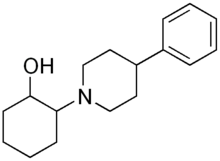Vesamicol
 | |
| Legal status | |
|---|---|
| Legal status |
|
| Identifiers | |
| |
| CAS Number | |
| PubChem CID | |
| IUPHAR/BPS | |
| ChemSpider | |
| ChEMBL | |
| CompTox Dashboard (EPA) | |
| Chemical and physical data | |
| Formula | C17H25NO |
| Molar mass | 259.393 g·mol−1 |
| 3D model (JSmol) | |
| |
Vesamicol is an experimental drug, acting presynaptically by inhibiting acetylcholine (ACh) uptake into synaptic vesicles and reducing its release.[1] Vesamicol may have applications for the treatment of adenocarcinoma in situ of the lung.[2]
Mechanism of action
Vesamicol can be broadly categorized as a cholinergic physiological antagonist, because it reduces the apparent activity of cholinergic neurons, but does not act at the postsynaptic ACh receptor. Vesamicol causes a non-competitive and reversible block of the intracellular transporter VAChT responsible for carrying newly synthesized ACh into secretory vesicles in the presynaptic nerve terminal. This transport process is driven by a proton gradient between cell organelles and the cytoplasm. Blocking of acetylcholine loading leads to empty vesicles fusing with neuron membranes, decreasing ACh release.
References
- ^ Salin-Pascual RJ, Jimenez-Anguiano A (October 1995). "Vesamicol, an acetylcholine uptake blocker in presynaptic vesicles, suppresses rapid eye movement (REM) sleep in the rat". Psychopharmacology. 121 (4): 485–7. doi:10.1007/BF02246498. PMID 8619013.
- ^ Lau, J. K; Brown, K. C; Thornhill, B. A; Crabtree, C. M; Dom, A. M; Witte, T. R; Hardman, W. E; McNees, C. A; Stover, C. A; Carpenter, A. B; Luo, H; Chen, Y. C; Shiflett, B. S; Dasgupta, P (2012). "Inhibition of Cholinergic Signaling Causes Apoptosis in Human Bronchioalveolar Carcinoma" (PDF). Cancer Research. 73 (4): 1328. doi:10.1158/0008-5472.CAN-12-3190. PMID 23222296.
